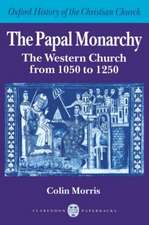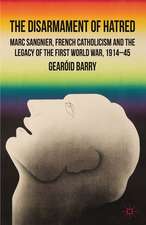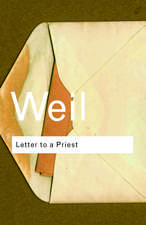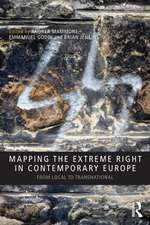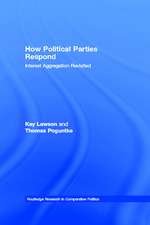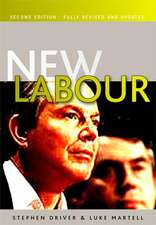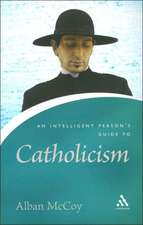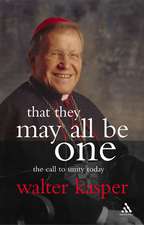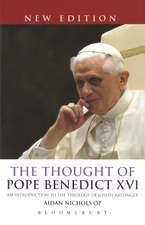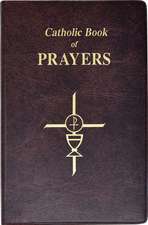Political Catholicism in Europe 1918-1945: Volume 1
Editat de Wolfram Kaiser, Helmut Wohnouten Limba Engleză Paperback – 27 mai 2004
Specific country chapters address key questions about the parties' membership and social organization; their economic and social policies; and their European and international policies at a time of increasing national and ethnic conflict, and the book includes two survey chapters explaining the origins of political catholicism in 19th century Europe and comparing the parties' interwar development, and two chapters on
transnational party contacts.
Along with its companion volume, Christian Democracy in Europe Since 1945, also published in 2004, students will have an abundandce of information to guide them through their studies on this fascinating subject.
| Toate formatele și edițiile | Preț | Express |
|---|---|---|
| Paperback (1) | 451.16 lei 6-8 săpt. | |
| Taylor & Francis – 27 mai 2004 | 451.16 lei 6-8 săpt. | |
| Hardback (1) | 1060.25 lei 6-8 săpt. | |
| Taylor & Francis – 27 mai 2004 | 1060.25 lei 6-8 săpt. |
Preț: 451.16 lei
Nou
Puncte Express: 677
Preț estimativ în valută:
86.33€ • 90.13$ • 71.45£
86.33€ • 90.13$ • 71.45£
Carte tipărită la comandă
Livrare economică 04-18 aprilie
Preluare comenzi: 021 569.72.76
Specificații
ISBN-13: 9780714685373
ISBN-10: 0714685372
Pagini: 316
Dimensiuni: 156 x 234 x 18 mm
Greutate: 0.49 kg
Ediția:1
Editura: Taylor & Francis
Colecția Routledge
Locul publicării:Oxford, United Kingdom
ISBN-10: 0714685372
Pagini: 316
Dimensiuni: 156 x 234 x 18 mm
Greutate: 0.49 kg
Ediția:1
Editura: Taylor & Francis
Colecția Routledge
Locul publicării:Oxford, United Kingdom
Public țintă
Postgraduate and UndergraduateNotă biografică
Wolfram Kaiser is Professor of European Studies, University of Portsmouth, and Visiting Professor at the College of Europe, Bruges, Belgium. He is joint editor of the companion volume to this set, Christian Democracy in Europe since 1945; and previous publications include Culture Wars: Secular-Catholic Conflict in Nineteenth Century Europe; and Using Europe: Abusing the Europeans: Britain and European Integration 1945-1963. He is currently working on a book on transnational Christian democracy in twentieth century Europe.
Helmut Wohnout is Director of the Karl von Vogelsang Institute in Vienna. He has published widely on contemporary Austrian history, and is the editor of the yearbook Demokratie und Geschichte.
Helmut Wohnout is Director of the Karl von Vogelsang Institute in Vienna. He has published widely on contemporary Austrian history, and is the editor of the yearbook Demokratie und Geschichte.
Recenzii
'These two volumes represent a useful and thoughtful contribution to our understanding of the character of interwar Catholic political action, the realignment of the post-1945 European political system and the emergence of a healthy and stable democratic polity.' - Ronald J. Ross, University of Wisconsin - Milwaukee, USA
Cuprins
Notes on Contributors, Introduction, 1 Catholics, Christians and the Challenges of Democracy: The Heritage of the Nineteenth Century, 2 A Microcosm of Society or the Key to a Majority in the Reichstag? The Centre Party in Germany, 3 Catholics between Emancipation and Integration: The Conservative People’s Party in Switzerland, 4 A Historical Detour: The Roman Catholic State Party in the Netherlands, 5 Religion, Class and Language: The Catholic Party in Belgium, 6 Christian Democracy and Centrism: The Popular Democratic Party in France, 7 Between the Crisis of the Liberal State, Fascism and a Democratic Perspective: The Popular Party in Italy, 8 A Powerful Catholic Church, Unstable State and Authoritarian Political Regime: The Christian Democratic Party in Poland, 9 Middle-class Governmental Party and Secular Arm of the Catholic Church: The Christian Socials in Austria, 10 Collaborating with Horthy: Political Catholicism and Christian Political Organizations in Hungary, 11 Catholic People’s Parties in East Central Europe: The Bohemian Lands and Slovakia, 12 Catholic Politics or Christian Democracy? The Evolution of Inter-war Political Catholicism, 13 Anticipated Exile of Catholic Democrats: The Secrétariat International des Partis Démocratiques d’Inspiration Chrétienne, 14 Transnational Networks of Catholic Politicians in Exile, Index
Descriere
This book seeks to explain the role of Catholic parties in inter-war Europe in a systematically pan-European comparative perspective.



